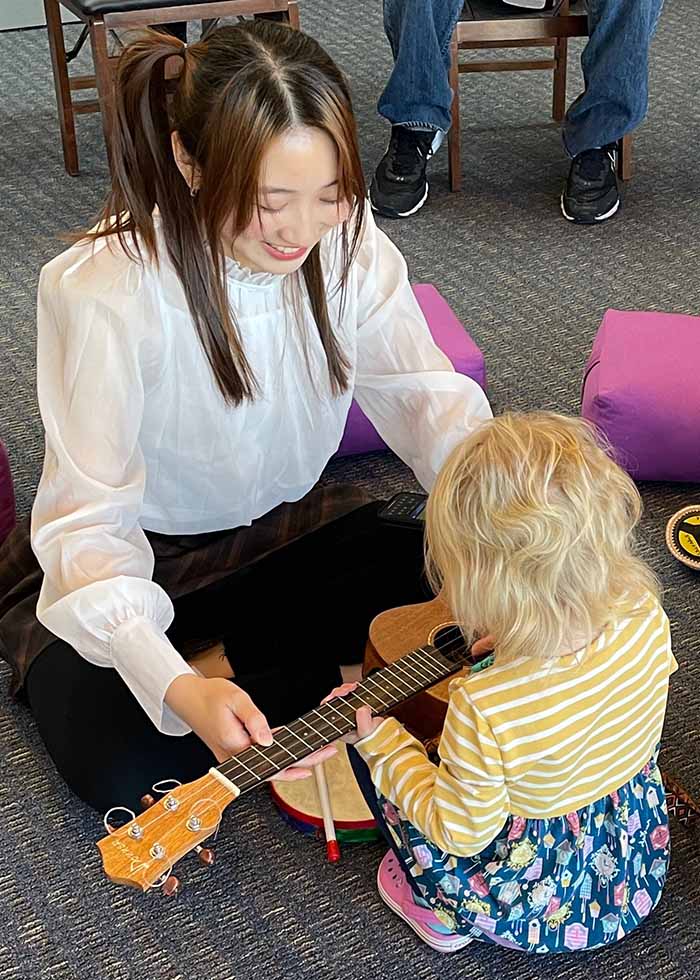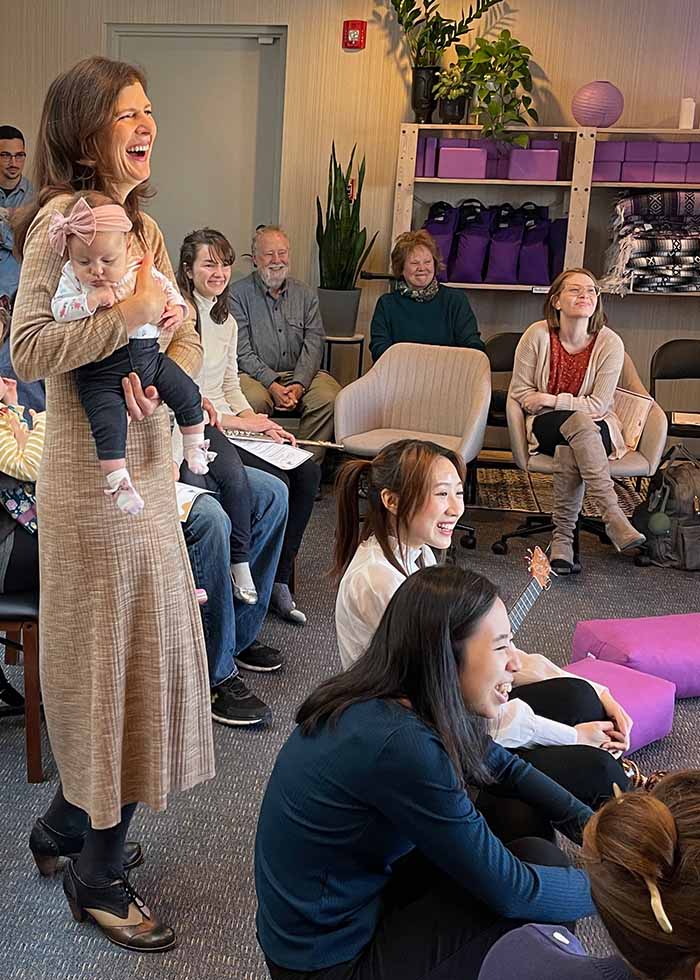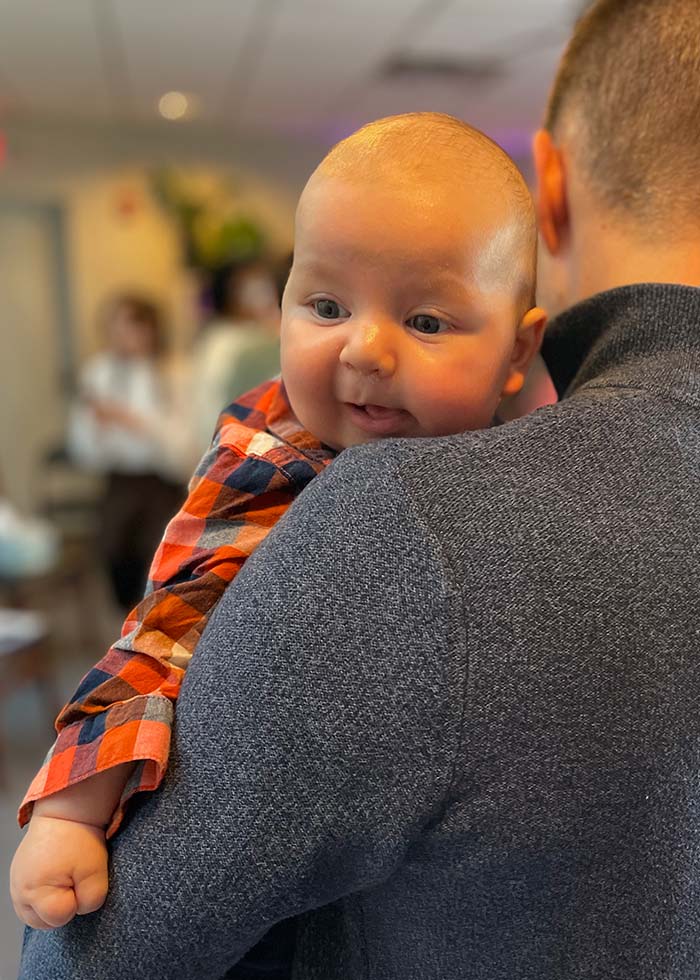Lullaby Project
Bonding Parents and Babies through Music
written by
Pam Wigley
Crooning lullabies to babies has been part of the child-rearing process almost since time began. When parents create a personal tribute to their newborns, especially amid difficult birthing circumstances, the results are a magical part of their child’s life journey.
Allegheny Health Network (AHN) and Carnegie Mellon University’s (CMU) School of Music in the College of Fine Arts (CFA) came together recently to help new parents and children begin that journey. AHN and CMU brought the internationally renowned "Lullaby Project," a program of New York’s Carnegie Hall, to Pittsburgh. The project, part of a CFA pilot course, paired student musicians with pregnant AHN patients to write and compose personalized lullabies for their babies. The goals: enhance maternal health, aid childhood development and strengthen the bond between parent and child.
This is the first partnership in the country between a health system and an academic university to launch the Lullaby Project, and it’s the second only Lullaby Project in Pennsylvania. CFA added a special component to the program, incorporating sensitivity and trauma-informed training into the syllabus. To that end, College of Fine Arts Assistant Dean for Diversity, Equity and Inclusion Valeria J. Martinez worked with students and parents throughout the project. The Pittsburgh Lullaby Project’s celebratory concert took place at Nov. 20, 2022.
CMU collaborated with Tracey Vogel, M.D., anesthesiologist and director of the Perinatal Trauma-informed Care (TIC) clinic at AHN’s West Penn Hospital to select patients for the project, as well as educate enrolled CMU students on this highly specialized and innovative approach.
"Since its inception, the Lullaby Project has worked with new parents in challenging circumstances to foster an increased maternal bond. Trauma affects health over a lifetime, and we felt that collaborating with AHN could have a meaningful impact on parents and babies with traumatic birth stories,"
Monique Mead
Associate Teaching Professor, School of Music
"My hope this semester was to guide our teaching artists to support these new or expecting parents in expressing their love, hope and blessings for their children in an original, personalized way."
The AHN Perinatal TIC is one of the country’s first such programs geared specifically toward obstetric patients. Dr. Vogel works closely with these patients to develop optimal birthing plans that address and help prevent postpartum psychological and/or physical complications.
"The AHN trauma-informed care clinic serves patients who have diverse experiences with trauma, from pre-existing events like domestic violence or sexual abuse to post-birth trauma, emergency cesarean delivery or major loss of blood with a previous delivery," Dr. Vogel said. "As these women prepare for another birth, it’s critical that their traumatic history is considered."
According to research commissioned by the Lullaby Project, early results of the program demonstrate that creating and singing lullabies is mutually beneficial for parents and their children. By taking part in workshops, parents reported feeling a sense of improved well-being and heightened creativity, as well as a restored positive outlook for the entire family. From a clinical perspective, introduction to music early and often has shown to positively impact infant brain and social development.
The CMU/AHN collaboration officially kicked off in early October with the first half of the semester dedicated to learning about trauma-informed care, the history of lullabies, their application across the globe and the process of prompting and later writing a personalized lullaby. The second half focused on songwriting and recording sessions, all of which took place at the Awareness & Wellness Center (AWC) in Shadyside, Pa., a space also dedicated to healing from trauma.



"In their first session, participants worked with project musicians to compose an original lullaby for their children," Mead explained. "In a second session, parents worked with performers, composers and arrangers to refine and record their lullaby, and the entire program came together in a celebration of the compositions. The sessions were deeply intimate, and we hope that we can make these moms and dads proud with how we set the stage to help them convey their feelings through music."
Martinez, who co-taught the course with Mead, said the combination of sensitivity training and creative expression helped parents use music as a conduit to healing.
"We were able to supplement what the original Lullaby Project required with training, teaching and facilitation on culturally responsive pedagogy, cultural competencies, critical race theory and thinking and understanding forms of oppression," Martinez said.
"This course proves that incorporating those subjects into a curriculum can foster a better human experience and interaction. Our class helps people be better people, and this project is exceptional because it does that for people around the world."
Valeria J. Martinez
Assistant Dean for Diversity, Equity and Inclusion
In New York City, the Lullaby Project reaches mothers in hospitals, homeless shelters, foster care centers, schools and correctional facilities. The first Lullaby Project took place at Jacobi Medical Center in Bronx, N.Y., in December 2011. Since then, more than 2,500 families have written original songs for their children, many of which are available for listening and sharing at carnegiehall.org/lullabies or at lullabypgh.com.